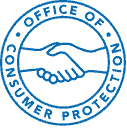More in About Us
Frequently Asked Questions
Search
Number of results:
What should I do if I have an issue with a business?
Start by talking to the business. Speak with the manager, owner, or corporate office. Be polite but clear about your problem. Give them a chance to fix the issue.
If the business hasn’t been able to solve your problem, we might be able to help. If you're unsure about your situation or just want to talk it through, reach out to us. You can call, email, or visit our office during business hours. Someone will always be there to give advice and help you figure things out. Contact us or file a complaint to get started.
What happens when I file a complaint with OCP?
When you file a complaint, you will receive a complaint number. An administrator will review your complaint and assign it to an investigator. Shortly after this assignment, you will receive a letter from our office containing your investigator's contact information. Your investigator will reach out regularly to request documentation and discuss your case with you. They will also communicate with the business as they work towards a resolution for your issue.
How quickly will OCP resolve my complaint?
We recognize that some situations may need prompt attention, and we’re here to help. We strive to complete as investigations within 45 business days. We always aim to assist you as best we can.
Can OCP help if a business is rude or discriminatory towards me?
It's unfortunate when people get treated poorly by businesses. OCP regulates deceptive trade practices but cannot ensure businesses to treat their consumers kindly. However, there may be a government office that can help you. Contact MC311 to get in touch with the appropriate office.
Does OCP have a list of top-rated businesses?
As a government agency, we do not rank businesses or provide recommendations. You can search for complaints from the last 3 years. If you would like additional information, you can file a Maryland Public Information Act Request to see the details of the complaint.
